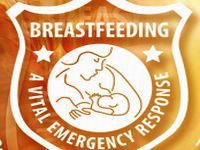World Breastfeeding Week 2013
"Breastfeeding support: close to mothers" is the theme for this week, World Breastfeeding Week. On the agenda, reinforcing the Ten Steps, making sure breastfeeding rates are withheld after birth and providing support for mothers without healthcare facilities.

World Breastfeeding Week 2013 is about Breastfeeding Peer Counselling, providing continued community support for mothers to ensure that exclusive breastfeeding carries on after delivery, that alternative systems are provided when a healthcare facility is not available.
According to the World Health Organization, "Traditionally, support is provided by the family. As societies change, however, in particular with urbanization, support for mothers from a wider circle is needed, whether it is provided by trained health workers, lactation consultants, community leaders, or from friends who are also mothers, and/or from fathers/partners".
The Peer Counselling Program identifies Peer Counsellors who are trained to support mothers, providing daily support for a breastfeeding mother within her home and within her community.
The objectives for this year's World Breastfeeding Week are as follows:
1. To draw attention to the importance of Peer Support in helping mothers to establish and sustain breastfeeding.
2. To inform people of the highly effective benefits of Peer Counselling, and unite efforts to expand peer counselling programmes.
3. To encourage breastfeeding supporters, regardless of thei r educat ional background, to step forward and be trained to support mothers and babies.
4. To identify local community support contacts for breastfeeding mothers, that women can go to for help and support after giving birth.
5. To call on governments and maternity facilities globally to actively implement the Ten Steps, in particular Step 10, to improve duration and rates of exclusive breastfeeding.
Ten Steps to Successful Breastfeeding
Every facility providing maternity services and care for newborn infants should:
- Have a written breastfeeding policy that is routinely communicated to all health care staff.
- Train all health care staff in skills necessary to implement this policy.
- Inform all pregnant women about the benefits and management of breastfeeding.
- Help mothers initiate breastfeeding within half an hour of birth.
- Show mothers how to breastfeed, and how to maintain lactation even if they should be separated from their infants.
- Give newborn infants no food or drink other than breast milk, unless medically indicated.
- Practise rooming-in - that is, allow mothers and infants to remain together - 24 hours a day.
- Encourage breastfeeding on demand.
- Give no artificial teats or pacifiers (also called dummies or soothers) to breastfeeding infants.
- Foster the establishment of breastfeeding support groups and refer mothers to them on discharge from the hospital or clinic.
Source: Protecting, Promoting and Supporting Breastfeeding: The Special Role of Maternity Services, a joint WHO/UNICEF statement published by the World Health Organization.
Sources: UN Women, WHO, UNICEF
Timothy Bancroft-Hinchey
Pravda.Ru
Subscribe to Pravda.Ru Telegram channel, Facebook, RSS!


